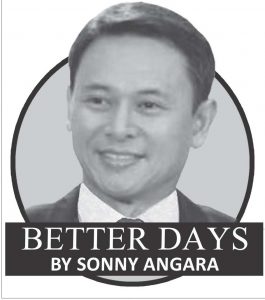Part of our economic recovery is ensuring that Filipinos are provided with the opportunity to become productive citizens. And for a number of our countrymen, this includes passing licensure examinations for aspiring professionals. This is especially true during this time where the country needs more doctors, nurses, teachers, policemen, and many other highly skilled workers.
Unlike other countries who have already vaccinated a significant portion of their population, the Philippines still finds itself in the early stages of its nationwide vaccination program mainly due to the limited supply of doses. According to recent data from our health authorities, around 65.3 million or 93% of the 70 million target population for 2021 have yet to be fully vaccinated. 
Admittedly, there is still a long way to go to achieve what our health experts call population protection and herd immunity; however, we’re expecting that the government will further ramp up the vaccination efforts with the arrival of more doses in the country. That being said, it is imperative that while we are still in the midst of a raging pandemic with a new, even more virulent variant threatening even the most vaccinated countries, the government continues to be on the lookout for policies that will not only help curb the spread of the virus but also provide Filipinos with have a small sense of normalcy.
A low-hanging fruit in this regard would be to expand the reach of government services, especially those which are usually availed of by many Filipinos. For instance, I have recently urged the Professional Regulatory Commission (PRC) to consider establishing more satellite venues in the provinces for its board examinations to allow aspiring professionals to take their licensure exams in much closer proximity to their homes.
Not only would this lessen the risk of exposure to the virus, it could also help reduce the out-of-pocket expenses of test-takers—many of whom have yet to be employed and hence are still experiencing financial constraints amid the pandemic. On top of the usual costs to these licensure exams such as transportation to the regional offices and accommodations, examines might even need to undergo COVID-19 testing which could cost as high as P5,000.
These financial and mobility constraints could affect a significant portion of our soon-to-be teachers, doctors, nurses, policemen, and other professionals especially as PRC announced in February that they have scheduled 101 licensure examinations for 2021 in order to make up for only conducting 11 exams last year.
In fact, PRC Chairman Teofilo Pilando Jr. reported that only around 200,000 examinees applied last year which is less than half of the 660,000 who took the exams in 2019. So it is expected that since PRC was forced to postpone most of the licensure exams last year, an influx of aspiring professionals would grab the opportunity to take the exams this year.
Consider that for the remainder of the year, among the scheduled licensure examinations are for veterinarians, engineers, customs brokers, therapists, teachers, accountants, agriculturists, social workers, and criminologists. Also among the thousands of licensure examinees are future doctors, nurses, midwives, medical technologists, x-ray technologists, therapists, pharmacists, nutritionists-dietitians, and dentists. So any means to ensure that our future frontliners—whether on the front lines of our health or of our economic recovery—are afforded even a small convenience should push through.
We commend PRC for issuing a series of resolutions designating new testing areas for various licensure exams in addition to planning the rollout of computer-based licensure exams before the end of the year in consideration of the ballooning cost – both from the PRC and the examinees – and the safety of everyone involved. But with an expected high number of examinees, the government should be able to provide them with venues where they can feel secure; allowing them to focus only on the tests. Our call—particularly for PRC to have satellite testing venues in provinces where there are over 100 examinees—could be done through local partnerships wherein our LGUs can provide appropriate testing sites and personnel for their constituents all of which adheres not only to the standards of the Commission but also to stringent health and safety regulations.
Part of our economic recovery is ensuring that Filipinos are provided with the opportunity to become productive citizens. And for a number of our countrymen, this includes passing licensure examinations for aspiring professionals. This is especially true during this time where the country needs more doctors, nurses, teachers, policemen, and many other highly skilled workers. Hence, collaboration between the national government and the local government in this regard should be strengthened if only to address, at the very least, some of the prohibitive circumstances that hinder Filipinos from attaining their full potential.
***
Sen. Sonny Angara has been in public service for 17 years. He has authored and sponsored more than 200 laws. He is currently serving his second term in the Senate.
***
E-mail: sensonnyangara@yahoo.com| Facebook, Twitter & Instagram: @sonnyangara/WDJ

